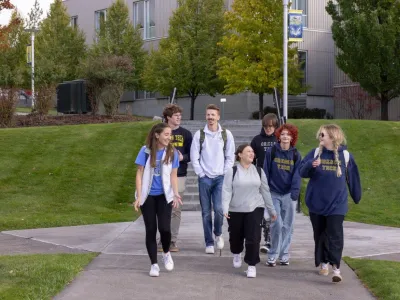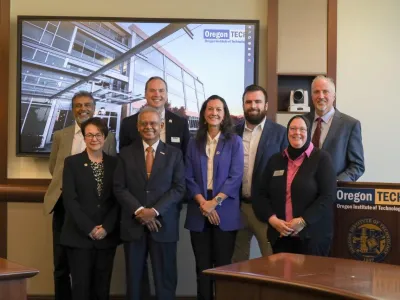WILSONVILLE, OR: The Oregon Institute of Technology (Oregon Tech) Board of Trustees, met July 9 and 10 in their first meeting as a governing board with full powers and authorities. The Board has convened since January of this year under limited authorities to begin the transition process from a centralized university system to a decentralized network of seven public universities on July 1.
Executive Committee:
- Heard a report on current integrated Marketing and Communications Strategies from AVP of Marketing/Communications Di Saunders, that support enrollment at Oregon Tech, with Trustees proposing a working group of the Board on strategic enrollment management.
- Heard from Provost Brad Burda about the HECC’s university evaluation process, Oregon Tech’s mission alignment, and changes that might want to be made.
- Approved a recommendation to authorize the investment of university funds in the Oregon Public University Fund after a presentation by Acting Vice President of Finance and Administration, Michelle Meyer.
- Heard an investment report on the University Shared Services Enterprise from Penny Burgess, Executive Director.
- Heard reports from Acting VP Meyer on the 2015-17 Biennium Education and General Operating Summary of Funding levels; the 2015-17 Education and General Preliminary Operating Budgets; University space inventory, capital construction/renovation, and deferred maintenance; the Facility Master Planning update; and a discussion on Institutional Risk led by Chair Sliwa.
- Discussed new or expanded functions transferred to Oregon Tech with the dissolution of the Oregon University System, such as internal audit, legal services, and risk management.
- Reviewed the components of academic quality and the accreditation process presented by Provost Burda.
- Reviewed the university’s compliance with Title IX and Violence Against Women Act., led by VP of Student Affairs/Dean of Students, Erin Foley.
- Reviewed an Enrollment, Retention and Graduation handout for discussion at future meeting VP of Student Affairs/Dean of Students Foley
- Recommended to the Provost’s Council, made up of all of the Provosts for Oregon’s Public Universities, approval of a new program at Oregon Tech, a Master of Science in Allied Heath. Provost Burda described the purpose of the degree program, which is to prepare allied health professionals for positions in management, education and administration in their respective healthcare disciplines. This degree will allow graduates to advance in their professional careers by providing them with advanced skills to conduct research, teach and implement. Once the Provosts’ Council approves the program it then goes to the Higher Education Coordinating Commission for final review and approval.
Heard an update on the outcomes of the Legislative Session from Lita Colligan, AVP for Strategic Partnerships and Government Relations.
Heard a report from Terri Torres, Vice President of the Oregon Tech Faculty Senate, including salary increase recommendations, and overload pay rate for faculty.
Approved the charters of the Committees of the Board of Trustees.
Heard a report from Bill Goloski, Chair of the Oregon Tech Administrative Council, including building an unclassified staff handbook, an acronym guide, and improving Spirit Week on both campuses.
Approved Oregon Tech’s mission statement and core themes.
Amended Resolution 15-3 Authorizing the President to Repeal Administrative Rules and Adopt Certain Rules as University Policies.
Approved a Resolution Authorizing the Investment of University Funds in the Oregon Public University Fund.
Approved a Resolution Authorizing the Sale of an Interest in Real Property and Improvements of Oregon Tech’s ownership of its former Harmony Road campus.
Directed staff to make a recommendation of an auditor and Board would enter into contract and manage.









